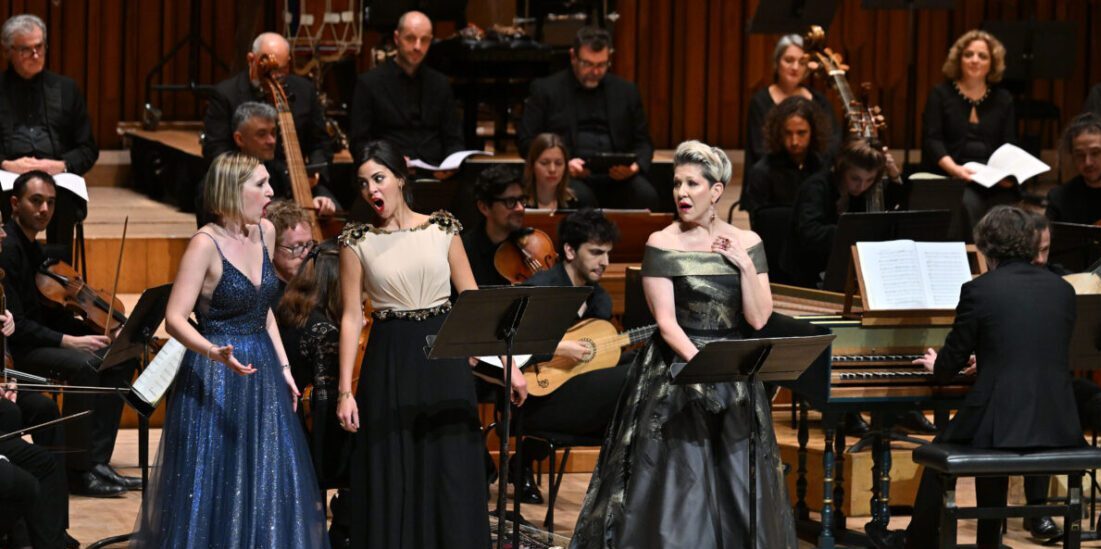When American superstar mezzo Joyce DiDonato comes to town, it is always a hot ticket.
This time she returns with Il Pomo d’Oro, conducted by Russian Maxim Emelyanychev from the harpsichord, with little-known Carissimi’s Jepthe and well-known Purcell’s Dido and Aeneas, as part of a European tour.
Carissimi’s music was widely known and popular especially Jephte which was considered one of the finest works of the time notably the chorus ‘Plorate filii Israel’ (Weep, you children of Israel). Handel echoed the final Jepthe chorus in his oratorio, Samson, a hundred years later. Handel also composed his own Jeptha, fleshing out the story in more detail.
Jeptha promises God that if he defeats the Ammonites in battle, he will sacrifice the first living creature he sees on his return; it is his daughter. The oratorio focuses on the human drama of his daughter’s lament over her fate.
The story is narrated by solo recitatives, ariosos and contrasting six-voice chorus. Musically, the solo sections including the daughter’s final lament and the dissonances in the final chorus are the most successful. English tenor Andrew Staples gives a sensitive interpretation to Jepthe’s agony with lovely pianissimi. Italian soprano Carlotta Colombo’s light voice is well suited to early music and is poignantly tragic as Figlia, in the acceptance of her fate.
It is a pleasant appetiser to the main event.
Joyce DiDonato enters to great applause.
As Dido, the ill-fated Queen to be abandoned by Aeneas, she uses a pure fil di voce for ‘I am pressed with torment…’. She pares her voice down to a chilling almost-nothing for ‘peace and I are strangers grown’, then filling with expression for ‘I languish’.
Egyptian soprano Fatma Said as Belinda, Dido’s handmaiden, over gesticulates. The voice is spread and unfocussed, the words unintelligible, and the top notes strangely produced in ‘pursue thy conquest’. The voice is not suited to this music.
Andrew Staples, sings a more sympathetic, ardent Aeneas than usual, using lovely vocal shading and nuance. Aeneas’ impossible dilemma of obeying the gods, or staying with Dido is more understandable when DiDonato’s Dido furiously dispatches him.
English counter-tenor Hugh Cutting as the Spirit has only one verse to sing, but does it with panache. We shall hear more of him.
Scottish mezzo Beth Taylor was a 2023 Cardiff competitor. As the Sorceress, she does not have much music to sing, but steals the show with presence, flamboyance and beauty of voice. Taylor lets rip with cackling joy of all the havoc she causes. She has a varied vocal palette and exciting lower register; we shall hear more of her.
The lovely sailor’s sea shanty – ‘come away, fellow sailors’, should be a welcome light moment in the tragedy. The sailors must leave Carthage, their drink and women, at very short notice. Emyanchayev’s tempo is too fast, killing the musical lilt; ‘Take a boozy short leave’ needs the time to sound booooozy; rushed, it is not boozy. Similarly, ‘silence their yearning’, the appoggiatura on ‘yearning’ needs rubato or one cannot express yearning. The rushed tempo deprives Massimo Altieri the space to shine by using the music and words as Purcell requires.
Dido ends the tragedy with the first and best real aria in the history of opera – ‘Thy hand Belinda…when I am laid’. The lament has been sung by many singers, sopranos and mezzos from Jessye Norman to Janet Baker. Dido, so passionately in love with Aeneas, cannot bear life without him, dies after the lament. Didonato gradually takes the weight out of her voice, the closer she is to death, adding interesting original ornamentation. She has some strange vowels – ‘when I am leed’ instead of ‘laid’. The two final ‘remember me’s’ lie high and are awkward to pitch, and tonight were slightly under the note; the purity and sincerity are stunning. This interpretation is a resigned Dido with nothing to live for.
After Dido’s death, the chorus gradually stand up one by one in homage before the final chorus. This is a lovely touch.
DiDonato set an impossibly high bar with War and Peace, and Eden. This performance, albeit enjoyable, does not reach those heights. As Dido only has about 15 minutes of sung music, Didonato fans may feel short-changed.
Historia Di Jepthe. Music by Giacomo Carissimi (1605-74)
Dido And Aeneas. Music by Henry Purell (1659-95)
Libretto Nahum Tate adopted from Virgil’s Aenid
Conducted by Maxim Emelyanychev
Cast includes Joyce DiDonato, Andrew Staples, Carlotta Colombo, Fatma Said, Beth Taylor, Hugh Cutting, Massimo Altieri.
Running time 2 hours with interval.
Photo Credit Mark Allan
2nd February 2024

